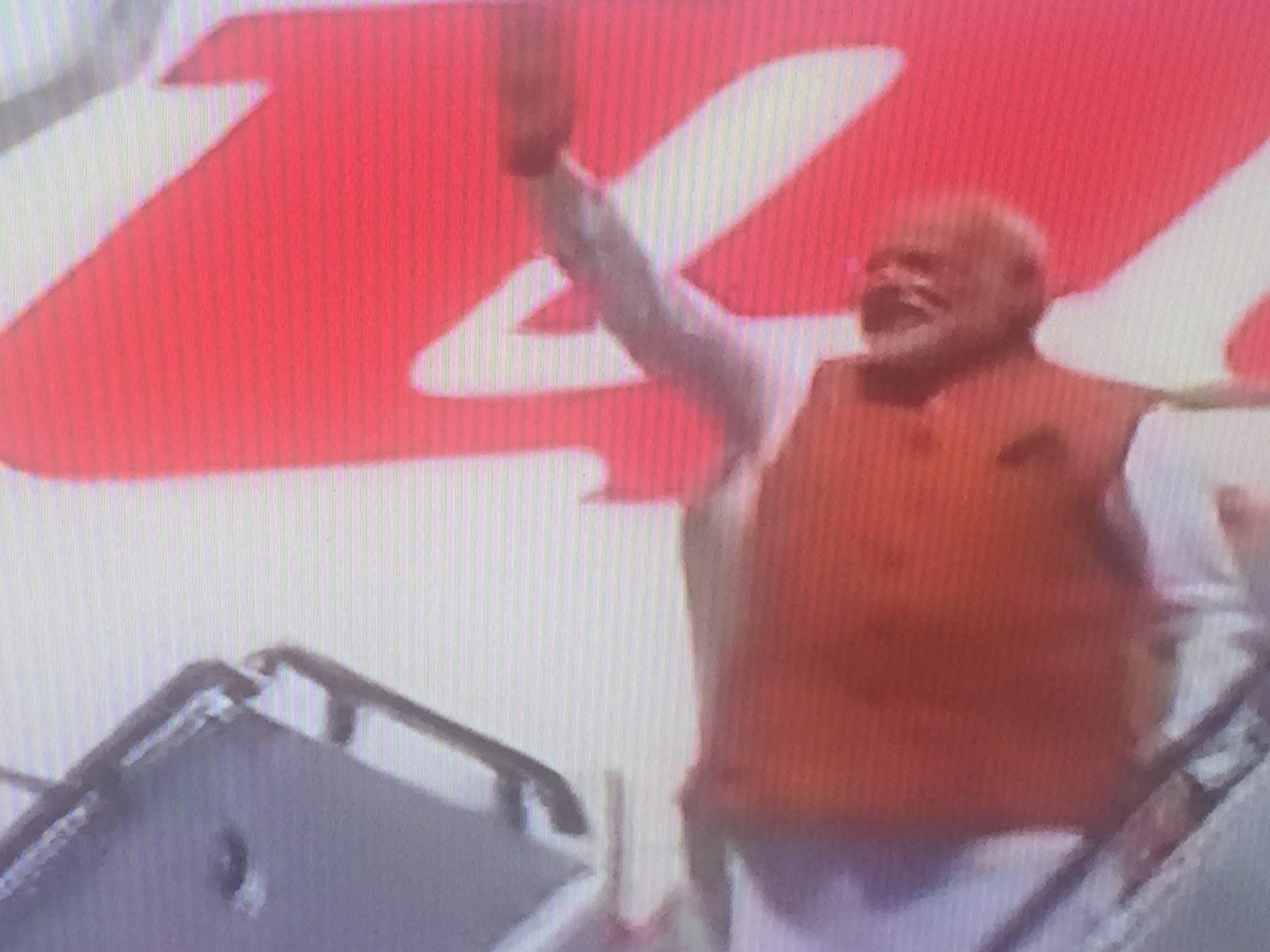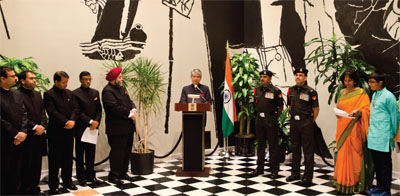
As Prime Minister Modi arrives on his fourth visit to the U.S. in the last two years, U.S. lawmakers have sharply criticized India’s human rights record. In a speech in New Delhi, U.S. Senator Benjamin L. Cardin (D-MD), the ranking minority-party member of the Senate Foreign Relations Committee, called on India to “do better” to address issues of violence against women, government corruption, extra-judicial killings, human trafficking and outdated anti-conversion laws that are still in use. “A country must respond to these challenges,” he said.
History teaches us that ultra-nationalism is a sentiment of superiority and aggression towards others or other countries. It is intrinsically connected to war and imperialism. Therefore, India as a pluralistic nation will be treading on dangerous waters with the ongoing nationalist campaign, and the Prime Minister has a great responsibility to set the right tone for the country.
Modi faced similar criticisms and faced protest demonstrations from one group or another every time he has touched down on the American soil. However, these strident criticisms from prominent lawmakers on the eve of Modi’s address to a joint session of Congress reveals a deep-seated reservation by many in Washington of a leader who once was denied entry into the country based on his human rights record.
At a Congressional hearing held a week ago in Washington, Bob Corker (Chairman of the Foreign Relations Committee R-Tenn.) and Timothy M. Kaine (D-VA) questioned State Department officials on India’s human rights issues, including its crackdown on nongovernmental organizations receiving foreign funding such as Greenpeace and Ford Foundation, rising intolerance and India’s recent decision to deny visas to the members of the U.S. Commission on International Religious Freedom who were planning to travel to India.
Undoubtedly, the Indian American Community as a whole would like to see the bi-lateral relations between the U.S. and India strengthened and the progress achieved in the last decade or so to be consolidated between these two democracies. However, a strategic alliance is a partnership that would require trust and confidence in each other for a long term value creating relationship. There is no doubt that both of these nations need each other in the new world order, and the question is whether these two countries are at a point where they are ready to move forward with such a commitment.
Therefore, it is pertinent to analyze the visit of the Prime Minister from that vantage point. If the objective of the collaborative relationship is to achieve success for both nations, how can one advance that notion while justifying the denial of visas to a U.S. government body that monitors the core tenets of both of these democracies: freedom and justice? The appropriate action ought to be in assisting each other to achieve these goals and together building a stronger relationship.
For those who are advocating more reliable protection of religious freedom got a boost recently when Congress upgraded the ‘Frank Wolf International Religious Freedom Act’ giving Administration and the State Department new political tools in monitoring and creating watch lists. The legislation has also upgraded the office to Ambassador-at-large, who will be directly reporting to the Secretary of State. It includes a provision as well directing the President to focus sanctions on individuals who carry out or order religious restrictions. The impact of these rules will eventually be felt across the board while nations draft agreements ranging from Trade to environment and Defense purchases.
President Obama’s speech in New Delhi, to great discomfiture of Modi, was a parting shot directed at his government to modify its behavior as regards respecting the pluralistic legacy of the modern India. He listed the relevant articles in the Indian Constitution to make his case. Despite the public posture, one could detect a chasm between these two leaders who seem to think and view things from different perspectives.
I have been told that at a recent dinner party in Washington, a former official was standing in line to greet President Obama. While shaking hands, the official congratulated the President for the bold statement he made in New Delhi. Obama first smiled and let go his hands and ready to greet the next guest, but on second thought, leaned forward, tapped his shoulder and said ‘I meant every word of it.’ That says a volume of the thinking in Washington, especially with this White House.
However, U.S. is dealing with a different India today that has gained stature as a growing economic power and a global player that has to be respected and may even be courted. For the U.S, the changing dynamics in Asia necessitates new alliances and reliable partnerships. A rising China has created new challenges for the U.S. in that part of the world and past agreements like the Indo-US civil nuclear deal point to a strategy of exploring ways to sustain their global engagement capability. Also, a 4 million strong Indian immigrant community in U.S. has become vocal supporters of close collaboration between these two countries, often lobbying with their Senators and Congressmen.
Despite all these natural advantages, India seemed to have put in a lot of effort in convincing the U.S. authorities for this ‘state visit’ and the upcoming appearance before the joint session of Congress. There are unconfirmed reports of a quid-pro-quo as regards major defense purchases preceded by a veiled warning of India taking its defense purchases elsewhere if the same level of respect is not accorded to Modi as it was with Dr. Manmohan Singh, his predecessor. It is widely known that the sound of money garners a lot of mileage in Washington just as in any other capital around the world. Apparently, Modi is getting his requital by gaining an opportunity to bloviate before those who once denied him a simple entry visa to the country.
However, if India has to gain genuine respect and be able to operate from a position of strength and moral clarity, it has to start dealing with some of the issues the lawmakers have raised. Last two years have witnessed growing intolerance in the country with attacks on places of worship of minorities, the murder of secular advocates and harassment of liberal thinkers. People are afraid that even their dietary habits like eating beef could cost them their lives. The HRD ministry has been converted to become a vehicle to promote the ‘Hindutva’ ideology across campuses by shutting down Dalit student organizations and applying sedition charges on students for mere sloganeering.
BJP and its followers seemed to believe that they have a monopoly in defining what constitutes nationalism, and it has become a cause of confusion and conflict in many university campuses. History teaches us that ultra-nationalism is a sentiment of superiority and aggression towards others or other countries. It is intrinsically connected to war and imperialism. Therefore, India as a pluralistic nation will be treading on dangerous waters with the ongoing nationalist campaign, and the Prime Minister has a great responsibility to set the right tone for the country.
Indian Diaspora in U.S. is much more a diverse community representing different regions, languages, cultures and faiths than what it is given credit for. According to latest statistics, 51% of the Diaspora consists of Hindus and the rest includes Muslims, Sikhs, Christians, Buddhists and other faiths. Indian Diaspora is primarily taking the shape of Hindu Diaspora due to the cultural identity, and most of the Indians including those who belong to other religions accept it as a practical matter. However, Rashtriya Swayamsevak Sangh (RSS branches outside of India) is becoming increasingly assertive in demanding unflinching patriotism and preservation of Hindu culture and continuing with their efforts to present a monolithic view of the Indian Diaspora to the American public. It is alleged that many of the Diaspora organizations are raising money under the cover of ‘charity’ and ‘development’ to support RSS and its affiliates to wage violence against religious minorities in India.
There is little doubt that the RSS cadre is playing a prominent role in many of Modi’s visits around the globe, particularly wherever there is a significant Indian community. It is only laudable that the Diaspora is enthusiastic and heartwarming towards any visit of a Prime Minister from their motherland. However, when that community is used as political pawns by turning them into a weapon against those who want to express their grievances; it not only defeats the purpose and good will but rather pits one group against the other and imports the same level of polarization and divisions to the country of their adoption. The recent attempt by Sangh organizations to reserve all 25 grounds on the Capitol Hill on the day of Modi’s visit to address the joint session of Congress is a case in point. That ‘clever’ and calculated maneuver made it almost impossible for any other group to gather near the venue and air their dissenting point of view that is protected under the U.S. Constitution. It is quite obvious to any independent observer that the objective of such action is to stifle criticism and banish any dissent which is contrary to the spirit of democracy, and it is quite appalling to see it happening right here in U.S.
It is time for the Prime Minister to be more assertive in addressing these concerns at home and abroad and speak out forcefully when human rights violations occur in India. Unless he can align the actions of the radical elements of his party in line with his lofty pronouncements abroad, the human rights issue will continue to cast a shadow on his trips abroad, especially to U.S. Alfred Whitney Griswold who once said the following: “Books won’t stay banned. They won’t burn. Ideas won’t go to jail. In the long run of history, the censor, and the inquisitor have always lost. The only weapon against bad ideas is better ideas”. Let freedom reign!
(The author is a former Chief Technology Officer of the United Nations and Chairman of the Indian National Overseas Congress, USA)




Be the first to comment